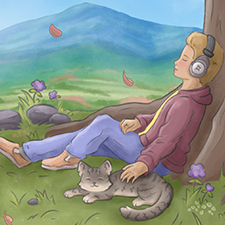
Bowlerhat Members
-
Posts
176 -
Joined
-
Last visited
-
Days Won
2
Profile Information
-
Pronouns
She/her
-
Interests
Music
Artist Settings
-
Collaboration Status
2. Maybe; Depends on Circumstances
-
Composition & Production Skills
Arrangement & Orchestration
-
Instrumental & Vocal Skills (List)
Flute
Recent Profile Visitors
7,651 profile views
Bowlerhat's Achievements
Apprentice (3/14)
-
Rare
-
Rare
-
Rare
-
Rare
-
Rare
Recent Badges
-
 Bowlerhat reacted to a post in a topic:
Banner removal
Bowlerhat reacted to a post in a topic:
Banner removal
-
Hello helloooo, I'm trying to remove a banner at the top of my artist profile, but I just can't figure out how. I believe I've checked everywhere, but besides the option to change or delete my profile pic I can't find any option to change or delete the banner. Does anyone know where this option is? Thank you!
-
I see! I still can't find it, but thank you! This also solved the issue
-
 Bowlerhat reacted to a post in a topic:
Where to find userid?
Bowlerhat reacted to a post in a topic:
Where to find userid?
-
Hi, hello! I'm apparently a big dumb dumb as I can't for the life of me find my userid anywhere. I need it for a new remix submission. The site says it's on my profile in the forums, but I can't find it anywhere. I don't remember having/needing it for my previous remix submissions also, is it a new thing or am I just stupid? Thank you for the help!
-
 djpretzel reacted to a post in a topic:
OCR04335 - Chrono Trigger "The Secret Was Clarinet"
djpretzel reacted to a post in a topic:
OCR04335 - Chrono Trigger "The Secret Was Clarinet"
-
OCR04335 - Chrono Trigger "The Secret Was Clarinet"
Bowlerhat replied to Liontamer's topic in ReMix Reviews & Comments
Cool stuff!! -
The theory I used in the above is the one taught at berkeley, although it's definitely more jazz oriented. That's why it included the 7th chords as well. They're negligible for the specific question so don't think too much about it. Definitely 3 sharps! You don't have to write down that it's in B dorian though. The moment the musician sees that it has a tonal center of B and 3 sharps they'll know it's dorian.
-
 BloomingLate reacted to a post in a topic:
Minor or Dorian? Finding the right scale to go with a melody.
BloomingLate reacted to a post in a topic:
Minor or Dorian? Finding the right scale to go with a melody.
-
Writing in Dorian is a completely valid thing to do and nothing to be afraid off. Great job on figuring these things out and jumping into advanced music theory! Definitely don't overthink it too much, if the Dorian scale fits the whole tune and the tonal center is B Dorian then that's probably just what it is. To get a bit into dominant tonic resolutions in Dorian: In modal music, such as Dorian, cadences have different functions. If we for example take your B dorian tune, the different degrees look like this: Im7 B-D-F#-A IIm7 C#-E-G#-B IIImaj7 D-F#-A-C# IVDom7 E-G#-B-D Vm7 F#-A-C#-E VIhalfdim7 G#-B-D-F# VIImaj7 A-C#-E-G# Which makes the V, which normally has a dominant sound in Western tonal music, as you've correctly observed indeed minor. You don't have to go to the I with a dominant chord, like the IV though, if you don't want to. You can approach it in minor from the V or from anywhere else you want. Something I personally really like is approaching it from the IIm7, since that's a uniquely Dorian sound. In the end, in modal music it's more about staying in the tonal center of B Dorian rather than having sub dominants and dominant structures. So the worst thing you can do in a tune that's in B Dorian is take a IV-V-I to A major for example, because you then lose the Dorian sound, despite keeping the same amount of sharps and flats. It's of course still something you can do though, musically speaking, if that's something that you want to do. But for writing Dorian it's a no-go. Play around with these degrees and see how they relate to the I tonic, modes are really interesting and bring many beautiful chordal structures that you lose by thinking too much in old fashioned neo-classical music theory.
-
 Bowlerhat reacted to a post in a topic:
Final Fantasy 9 – A Royal Tournament in Cleyra
Bowlerhat reacted to a post in a topic:
Final Fantasy 9 – A Royal Tournament in Cleyra
-
 Bowlerhat reacted to a post in a topic:
Mode Seven: A Jazz Tribute to the SNES - History
Bowlerhat reacted to a post in a topic:
Mode Seven: A Jazz Tribute to the SNES - History
-
 Rozovian reacted to a post in a topic:
Signatures disabled
Rozovian reacted to a post in a topic:
Signatures disabled
-
Reading along for a while made me think that it's maybe worthwhile to start a "how to keep OCR hip" threat in order to generally discuss what it is that the community wants and what they're hoping to see on this platform. I'm personally not much of a forum gal, but I do still love the whole video game remix exchange/discussion/whatever thingy that people have going on here on multiple different levels and in many different ways. However, I do also feel that it might be worthwhile to up the game on social media and such and get more involved with whatever the youngsters are doing these days. It actually took me a few days to find out that my own remix got posted a few days ago, since I'm not on the forum so much, and it simply didn't show up on my Facebook feed or on Instagram and such, even though I follow OCR on all these platforms. These are the places people are on nowadays, and I think that that's the place to hook people into the OCR life and keep them coming back. On the other hand, this might not be what OCR is going for in general, as this would also imply a shift in focus from traditional "foruming" to a more involved and generally bigger and different kind of OCR medium. I remember the discussion on the decline of reviews on remixes from a few years ago where people were already discussing the influence from Youtube and such and how this was influencing the decline of people making reviews on the forum. This might be a bit unrelated to the disabling of signatures, but reading all the suggestions and discussions above gave me the feeling that different people have a different idea of what OCR is and what it's going to be and what it's supposed to be and how to get there and why to get there and all that, and discussing this very important (and in my opinion also urgent) question among the community could be a good idea, seeing how this topic and issue keeps popping up in varying specific threads. I think it's time to start looking at the bigger picture.
-
 Bowlerhat reacted to a post in a topic:
Signatures disabled
Bowlerhat reacted to a post in a topic:
Signatures disabled
-
 Bowlerhat reacted to a post in a topic:
Signatures disabled
Bowlerhat reacted to a post in a topic:
Signatures disabled
-
 Bowlerhat reacted to a post in a topic:
OCR04025 - Legend of Zelda: Ocarina of Time "To See Like Me"
Bowlerhat reacted to a post in a topic:
OCR04025 - Legend of Zelda: Ocarina of Time "To See Like Me"
-
 Bowlerhat reacted to a post in a topic:
OCR04025 - Legend of Zelda: Ocarina of Time "To See Like Me"
Bowlerhat reacted to a post in a topic:
OCR04025 - Legend of Zelda: Ocarina of Time "To See Like Me"
-
 Bowlerhat reacted to a post in a topic:
OCR04025 - Legend of Zelda: Ocarina of Time "To See Like Me"
Bowlerhat reacted to a post in a topic:
OCR04025 - Legend of Zelda: Ocarina of Time "To See Like Me"
-
 Bowlerhat reacted to a post in a topic:
OCR04025 - Legend of Zelda: Ocarina of Time "To See Like Me"
Bowlerhat reacted to a post in a topic:
OCR04025 - Legend of Zelda: Ocarina of Time "To See Like Me"
-
OCR03978 - Legend of Zelda: Link's Awakening "Mah Boi"
Bowlerhat replied to Liontamer's topic in ReMix Reviews & Comments
This is soooooo good . I love it!! -
OCR03893 - Skies of Arcadia "Undervalued"
Bowlerhat replied to Liontamer's topic in ReMix Reviews & Comments
oooh, so nice! There's a lot of great ideas in here, I liked it a lot -
OCR03880 - Monkey Island 2 "Three-Headed Monkey Combat"
Bowlerhat replied to Liontamer's topic in ReMix Reviews & Comments
I loved the singing. It really cracked me up and fitted the source and remix really well! -
Bowlerhat started following A Song About A Feather , Reflections on being an artist in a modern consumerist society and the role of social media in re-shaping the relationship between artist and fan , I'm not that great at doing transitions between melodic ideas. and I'm having trouble making songs fit together and 1 other
-
As another Dutch person i thought it would be interesting to shed my light on the scene as well. Not particularly because I'm Dutch, but I find the subject to be engaging and worth talking about and also found it a nice coincidence. Like you said, there's an abundance of music at the moment and sticking out among the crowd is difficult. I agree with this. However, what I find interesting about your post are your reasons to make music. You name "the desire to express yourself" and looking for a "connection" with people. Personally, I'm a jazz artist. I used to study music composition in the Netherlands but I'm currently located in Germany. Of course, "expressing myself" and connecting with people has been a big reason to continue making music but I wouldn't call it the driving force. At all. This is naturally a subjective thing, but I do want to share my personal thoughts on this since I feel like it might open up some possibilities for other people as well. I make music to create music. For me the reason is very intrinsic. I love music, and I love writing music even more than that. For me the art of discovery and the excitement of finishing pieces, playing in ensembles, organizing concerts, making promo photos, the whole gizmo, it's amazing. Of course, when I make music I express myself, I also connect with other people, but I think that to realize that the fact that you're making music is fun and thrilling and emotional and generally just very wholesome is vital to keep doing this thing. Generally, want I want to say is that I'm simply not dealing at all with the things you're stating above. I'm getting a lot of satisfaction from making music. With that in mind I want to immediately stress that there's different ways of producing music. Personally, I write music in Sibelius and then I get the musicians together and we rehearse. Then, there's a concert and people pay to see that concert and I use that money to pay the musicians. That's like, the basic version haha. With this method I personally have a great way of "expressing myself', connecting with people (both the musicians I work with and the people who consume my music) and I'm also just having an awesome time with the whole thing of writing the music and organizing everything. Besides that, as an arranger I also make arrangements for big bands and such and sell those, and I also play gigs as a flute player in orchestra's, jazz ensembles or just random other gigs. Now, I'm going to quote something I found kind of funny about your post: The thing is that "the latest dance track" isn't so different from Mozart, or Bach or whomever else at all. That is, in principal. These people, especially Mozart were pouring out arrangements by the hour as well. The difference is that you cherry picked some of the finest musicians of their century against "a random guy on the internet". But honestly, they didn't spend that much more time on their music at all. In the end it all comes down to talent and creativity. And this thoughtlessly producing music is something I personally do as well. For example when I have to arrange something I don't really like for some kind of ensemble but I also do have to pay my rent so i do it anyway. It's like how Mozart did it, how Bach did it, how Thad Jones did it and how most arrangers and composers did it and still do it today. As you mentioned in your post, time filters things. But not just obscure artists, but also obscure pieces from famous artists. Mozart wrote a lot of music. Like a lot lot. And some of it is brilliant, and honestly some of it is sh*t. The point I'm trying to make here is that quantity isn't just a necessary thing for being a serious musician, it's even a good thing. Doing things more gives you experience and makes you better at it, it's as simple as that. Then, going back to my first point about producing music. I don't know what kind of art or music you make but assuming from your post I assume that it's something that you create by yourself and then release upon the internet. This is an entirely different approach than mine, and it isn't any better or worse, just different. And this is important to keep in mind. Because, what you're basically doing is that you're using this media, the internet, which you have many opinions about that directly contrast the way you want your way of making music to be, as your only way of releasing your music. It's counterproductive. I personally would never want to make a living from just uploading songs to the internet and having them be consumed by people I don't know. For the exact same reasons as you. But, I personally chose to just not do that. Of course, I still have to maintain a social media account for my band, book gigs, schedule rehearsals, write music for annoying people that you really don't want to work with but have to because they're paying you for making that arrangement, and other such things that proper adults do. But that's life, it's the way professional musicians in my field deal with things. And that's a completely different way other professional musicians in their respective field deal with things. My way might not be your way. But if the way that you're doing music currently isn't satisfying for you, then realize that there's other ways to do it as well. And here's why it's funny again that we're all Dutch here, because we're basically all growing up in the same environment. And yet we can all have different experiences, different perspectives and different working tools even though we're all just trying to make music. Which I think is also a nice proof that it isn't too late to change your way of looking at music, and the way you make music and produce music and find something that suits you and gives you the satisfaction that you want to get out of music. Because it's all possible, and in the end it's also the most important thing. To somehow have making music be intrinsically satisfying for you.
-
While all the other points are really good, in my opinion this is the most important thing to consider when making transitions. I would personally stretch the point even further and say: "Why transition at all?" I think that there's a merit to having a transition between two (or more) songs if there's a justifiable reason to have multiple source material in the first place. And I'd assume that if there is a good reason to have multiple source materials, then it'll probably be because of a good link between the songs which makes the question kind of obsolete. I think that rather than searching for a "transition" it makes more sense to look for a "cohesion". Of course there are some scenarios where you might be assigned to, or could even get paid to combine "contextually preferably uncombinable" things, and in that case I would definitely read the points made above a few times and really think about them because they're all very expertly made and elaborated on. This summer I got a job to write a big band arrangement for someone and she had some very specific form structure in mind that I personally would never use. But since I got paid to do the job, and she didn't really listen to my suggestions to change it to something more effective I just had to roll with it. It happens, and in such cases it's good to be able to do it. But these situations are outside of the point that I'm trying to make at the moment. To be honest, when remixing I think it's better to ask yourself: "How do I get more out of my source material so that I don't need to transition to a different song halfway". And when you really want to add another source tune, think to yourself: "What does this add to the music?: "How is this related to the rest?" "Where do I want to go?" "What do I want to say?" And when you're able to answer those questions with justifiable reasons, then the proper way to transition between songs will naturally come out of that. It's a very context specific thing, and the answer can be many things. In my experience, shifting too many times in one song between different genre's, source material, writing styles and all that good stuff takes away more than that it adds, and it's often a better idea to just write multiple tunes. It might not be the answer you're looking for, but i did want to add my two cents, since I feel that many remixers and writers often overlook these kind of things and tend to jump into quantity rather than quality. Not saying that that's necessarily what you're doing since, as many have already pointed out, you didn't give any examples of your music, but it's something to always keep in mind when writing. And asking some of the questions in the previous alinea might also solve other problems you could be dealing with, such as problems with flow, dynamics, instrumentation, motivic development, style, diversity and musical coherence among many things.
-
3. finished Asterix Orchestra Remix - Flute Collab
Bowlerhat replied to bluelighter's topic in Recruit & Collaborate!
Hi, I play flute! The link you posted isn't working however Could you maybe hit me up with a pm with some more specifics and details about what it is you're looking for exactly? You can find a mix I submitted to OCR here: https://ocremix.org/remix/OCR03675 I'm not playing flute on that mix though, so it might not be very helpful haha. But I can send you some flute mixes of mine as well of course -
Thanks! I was thinking a lot about breathing and pulse and I guess indeed also the meandering of a feather as it falls down. Which sounds kinda vague and artsy now that I think about it but it was mostly meant to be relaxing and light as you said haha.
-
Hiii, I wrote a short piano piece called "A Song About A Feather". What do you guys think?






